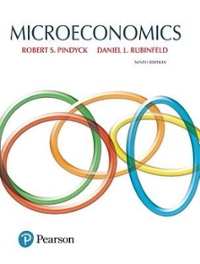Question
2. The more time consumers have to react to a price change, the greater will be their price elasticity of demand. a. True b. False
2. The more time consumers have to react to a price change, the greater will be their price elasticity of demand.
- a. True
- b. False
l
3. The income elasticity of demand for an economically inferior good is positive because, as income rises, demand for the good rises.
- a. True
- b. False
4. If household income increases 20% and household demand for potatoes declines 10%, the evidence shows that potatoes are a(n) _____.
- a. economically normal good
- b. economically inferior good
- c. luxury good
- d. price-elastic good
5. If household incomes decline during an economic downturn, and if demand for premium brands of orange juice fall as a result, these brands are economically normal goods.
- a. True
- b. False
6. The elasticity of a demand between any two points on a demand curve is measured as _____.
- a. % change in quantity demanded divided by % change in price
- b. the slope of the demand curve
- c. 1/slope of the demand curve
- d. change in price - change in quantity demanded
7. Elasticity in economics refers to a ratio of percentage changes in two related variables.
- a. True
- b. False
m
8. If, other things being equal, the % change in P is 20% and the associated % change in Qs is 10%, what is the price elasticity of supply?
- a. -2.0
- b. -0.5
- c. 0.5
- d. 2.0
9. If price elasticity of demand equals 1.0, then for that range of demand a 10% price increase will cause _____.
- a. a 1% increase in total revenue
- b. a 10% increase in total revenue
- c. no change in total revenue
- d. a 10% decrease in total revenue
10. The price elasticity of demand equals the percentage change in buyers' quantity demanded divided by the percentage change in quantity supplied.
- a. True
- b. False
11. If the price elasticity of demand equals 1.0, then a price change will cause no change in total revenue.
- a. True
- b. False
12. (Qd is quantity demanded.) If the price elasticity of demand is inelastic, then a 10% decrease in price will cause _____.
- a. more than a 10% increase in Qd
- b. exactly a 10% increase in Qd
- c. less than a 10% increase in Qd
- d. no increase in Qd
13. A vertical demand curve is said to be _____.
- a. perfectly elastic
- b. unitary elastic
- c. constant in elasticity
- d. perfectly inelastic
14. If the price elasticity of demand is inelastic, then a 10% increase in price will cause more than a 10% increase in quantity demanded.
- a. True
- b. False
15. [P is price and Qd is quantity demanded.] Which of these measures the elasticity of a demand between any two points on a demand curve?
- a. (Qd2 - Qd1) / (P2 - P1)
- b. (Qd2 - Qd1) * (P2 - P1)
- c. (Qd2 + Qd1) / (P2 + P1)
- d. (Qd2 - Qd1) / (Qd2 + Qd1) divided by (P2 - P1) / (P2 + P1)
T
16. A horizontal demand curve is said to be perfectly inelastic.
- a. True
- b. False
17. If price elasticity of demand equals 1.5, then we call this _____.
- a. perfectly inelastic demand
- b. inelastic demand
- c. unit elastic demand
- d. elastic demand
18. (Assume Qd is quantity demanded, and P is price.) The best way to calculate a price elasticity of demand is: (Qd2 - Qd1) / (P2 - P1).
- a. True
- b. False
19. If, other things being equal, the % change in P is -5% and the associated % change in Qd is 10%, what is the price elasticity of demand? Assume the minus sign matters.
- a. -2.0
- b. -0.5
- c. 0.5
- d. 2.0
20. Elastic demand means any value of elasticity less than 1.
- a. True
- b. False
Step by Step Solution
There are 3 Steps involved in it
Step: 1

Get Instant Access to Expert-Tailored Solutions
See step-by-step solutions with expert insights and AI powered tools for academic success
Step: 2

Step: 3

Ace Your Homework with AI
Get the answers you need in no time with our AI-driven, step-by-step assistance
Get Started


